|
|
|
Sort Order |
|
|
|
Items / Page
|
|
|
|
|
|
|
| Srl | Item |
| 1 |
ID:
141074


|
|
|
|
|
| Summary/Abstract |
With reference to original ethnographic and historical research on India, the papers collected in this forum suggest conceptual refinements that might re-centre the study of class in regional scholarship. Through discussions of class politics in industrial, construction and agricultural contexts, the authors interrogate the conceptual oppositions between stably employed fordist labour forces and the ‘working poor’ that have often constrained ethnographic and historical analyses of India's working classes. Inspired by Marxist historiography, this forum engages with the historically contingent emergence of Indian working classes through different types of labour, gender and ethnic struggles, and considers the complex political boundaries that are produced by such processes.
|
|
|
|
|
|
|
|
|
|
|
|
|
|
|
|
| 2 |
ID:
141073
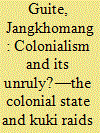

|
|
|
|
|
| Summary/Abstract |
This paper examines the colonial representation of tribal raids in the Northeast frontier of India and argues that, rather than being the ‘lawless and predatory habits of the savage hill tribes’, it was an expression of hill politics. The Kukis raided British territory when they discovered that an extension of the colonial boundary threatened their very existence as an independent state-evading population. It traces how the Kukis re-ethnicized themselves in the hills by evolving a system that is state-repellent, protected by a vast strip of forested jungle around their settlements commonly known as the ‘hunting ground’. It locates the ‘raid’ in the context of the difference in the perception of space and territoriality between the colonial state and indigenous polities. Colonial spatial ideology and its hill-valley binary are seen to play a vital role in animating tension on the frontier. The raid is thus understood as the ultimate weapon of resistance against an established state by an independent ‘not-a-state-subject’ people in defence of their autonomy and essentially represents non-state practices against state appropriations. Instead of being ‘unruly’, the raid is seen as a form of organized and premeditated resistance based on the consciousness of the hillmen's lived world order.
|
|
|
|
|
|
|
|
|
|
|
|
|
|
|
|
| 3 |
ID:
141077
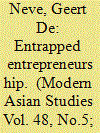

|
|
|
|
|
| Summary/Abstract |
As neoliberal restructuring leads to the rise of labour market intermediaries globally, labour contractors are being vilified as unscrupulous recruiters and as wicked figures who exploit and harass. Based on long-term ethnographic research among workers and contractors in the Tamil Nadu garment industry, this article argues for a more careful and grounded analysis of labour contractors’ role and position under neoliberalization. Evidence is presented of contractors’ precarious position at the tail end of global production networks and three conclusions are drawn. First, contractors reveal themselves to be a remarkably unrecognized source of entrepreneurship, flexibility, and skills acquisition, which facilitates manufacturers’ participation in global markets. Second, despite their resourcefulness and resilience, contractors find themselves trapped between management and the workforce, and in an overall situation of vulnerability as a result of the informal nature of their activities and the vagaries of the neoliberal market. For many of them this results in a highly fluid and unstable class experience, in which they struggle to materialize aspirations for upward mobility. Finally, neoliberal conditions tend to undermine rather than enhance contractors’ entrepreneurial success and to weaken rather than intensify their power with regard to both capital and labour.
|
|
|
|
|
|
|
|
|
|
|
|
|
|
|
|
| 4 |
ID:
141078
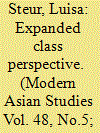

|
|
|
|
|
| Summary/Abstract |
Following the police raid on the ‘Muthanga’ land occupation by Adivasi (‘indigenous’) activists in Kerala, India, in February 2003, intense public debate erupted about the fate of Adivasis in this ‘model’ development state. Most commentators saw the land occupation either as the fight-back of Adivasis against their age-old colonization or the work of ‘external’ agitators. Capitalist restructuring and ‘globalization’ was generally seen as simply the latest chapter in the suffering of these Adivasis. Little focused attention was paid to the recent class trajectory of their lives under changing capitalist relations, the exact social processes under which they were having to make a living, and what had only recently—and still largely ambiguously—made them ready to identify themselves politically as ‘Adivasi’. Demonstrating the usefulness of ethnographic curiosity driven by an ‘expanded’ class analysis, as elaborated in Marxian anthropology, this article provides an alternative to the liberal-culturalist explanation of indigenism in Kerala. It argues instead that contemporary class processes—as experienced close to the skin by the people who decided to participate in the Muthanga struggle—were what shaped their decision to embrace indigenism.
|
|
|
|
|
|
|
|
|
|
|
|
|
|
|
|
| 5 |
ID:
141072
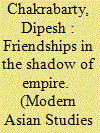

|
|
|
|
|
| Summary/Abstract |
This paper supplies the historical context to the Indian poet Rabindranath Tagore's (1861–1941) first visit to the city of Chicago in January 1913 when he spoke at the University of Chicago and established life-long friendships with some of the literary personalities of the city. By focusing on how Tagore came to be received by the University authorities and on his friendship with Harriet Vaughan Moody (1857–1932), the widow of the American writer William Vaughn Moody, it also seeks to trace the role that the themes of ‘empire’ and ‘civilization’ played in determining how the poet was received, understood, and admired by his foreign friends.
|
|
|
|
|
|
|
|
|
|
|
|
|
|
|
|
| 6 |
ID:
141079


|
|
|
|
|
| Summary/Abstract |
In 1989 India's political system underwent a process of profound change which affected the entire institutional setup of the country. Power was radically redistributed—it began to flow from the central government to the states, and from the Prime Minister's Office to the other institutions of the state. By analysing the severe institutional crisis which occurred during Mrs Gandhi's final term in office, this paper seeks to show how state institutions worked on the eve of such a redrawing of India's institutional setup. In addition, an effort is made to link the working of India's institutions to the configuration of the party system, thus stressing the importance of political dynamics in the functioning of parliamentary democracies.
|
|
|
|
|
|
|
|
|
|
|
|
|
|
|
|
| 7 |
ID:
141075
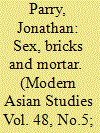

|
|
|
|
|
| Summary/Abstract |
Based on a case study of informal sector construction labour in the central Indian steel town of Bhilai, this paper explores the intersection and the mutually constitutive relationship between social class on the one hand, and gender (and more specifically sexual) relations on the other. It is part of an attempt to document and analyse a process of class differentiation within the manual labour force between aspirant middle class organized sector workers and the unorganized sector ‘labour class’. With some help from the (pre-capitalist) ‘culture’ of their commonly work-shy men-folk, their class situation forces ‘labour class’ women onto construction sites where they are vulnerable to the sexual predation of supervisors, contractors and owners. That some acquiesce reinforces the widespread belief that ‘labour class’ women are sexually available, which in turn provides ‘proof’ to the labour aristocracy that they themselves are a different and better breed, superior in culture and morals. Class inequalities produce a particular configuration of gender relations; gender relations (and in particular sexual relations) produce a powerful ideological justification for class differentiation. This proposition has strong resonances with processes reported from other parts of the world; but in the Indian context and in its specific focus on sex it has not been clearly articulated and its significance for class formation has not been adequately appreciated.
|
|
|
|
|
|
|
|
|
|
|
|
|
|
|
|
| 8 |
ID:
141076
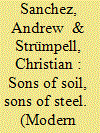

|
|
|
|
|
| Summary/Abstract |
Inspired by E. P. Thompson's modelling of class as the contingent outcome of historical processes, this paper explores how autochthony and descent came to inform the boundaries of industrial workforces in the Indian steel towns of Jamshedpur and Rourkela. We suggest that if class is a historical object, then it relates to other forms of power and identity in ways that question the use of rigid analytic typologies. In the private sector Tata company town of Jamshedpur, an industrial working class was constructed during the late colonial period from labour migrants, whose employment became heritable within families. In the public sector Rourkela Steel Plant, founded in the mid-twentieth century, the politics of ethno regionalism coincided with state development policy to inform employment reservation for autochthons. Through a historical analysis of urbanization, migration and employment policy, we consider how elite workforces that bound themselves according to the principles of autochthony and descent were formed in the social laboratories of India's steel towns. We suggest that such processes demand a class concept that engages more subtly with the work of E. P. Thompson.
|
|
|
|
|
|
|
|
|
|
|
|
|
|
|
|
| 9 |
ID:
141080


|
|
|
|
|
| Summary/Abstract |
Within a year of Indian independence, the Communist Party of India declared independence to be a false dawn and the whole Socialist bloc within the ruling Indian National Congress cut its ties with the national government. The speed with which the left disengaged from what had been a patriotic alliance under colonialism surprised many at the time and has perplexed historians ever since. Some have looked to the wider context of the Cold War to explain the onset of dissent within the Indian left. This paper points instead to the neglected domestic context, examining the lines of inclusion and exclusion that were drawn up in the process of the making of the new Indian constitution. Once in power, Congress leaders recalibrated their relationship with their former friends at the radical end of the political spectrum. Despite some of the well-known differences among leading Congress personalities, they spoke as one on industrial labour and the illegitimacy of strikes as a political weapon in the first year of national rule and declared advocates of class politics to be enemies of the Indian state. Congress thus attempted to sideline the Socialists and Communists and brand them as unacceptable in the new regime. This paper focuses on this first year of independence, emphasizing how rapidly the limits of Indian democracy were set in place.
|
|
|
|
|
|
|
|
|
|
|
|
|
|
|
|
|
|
|
|
|